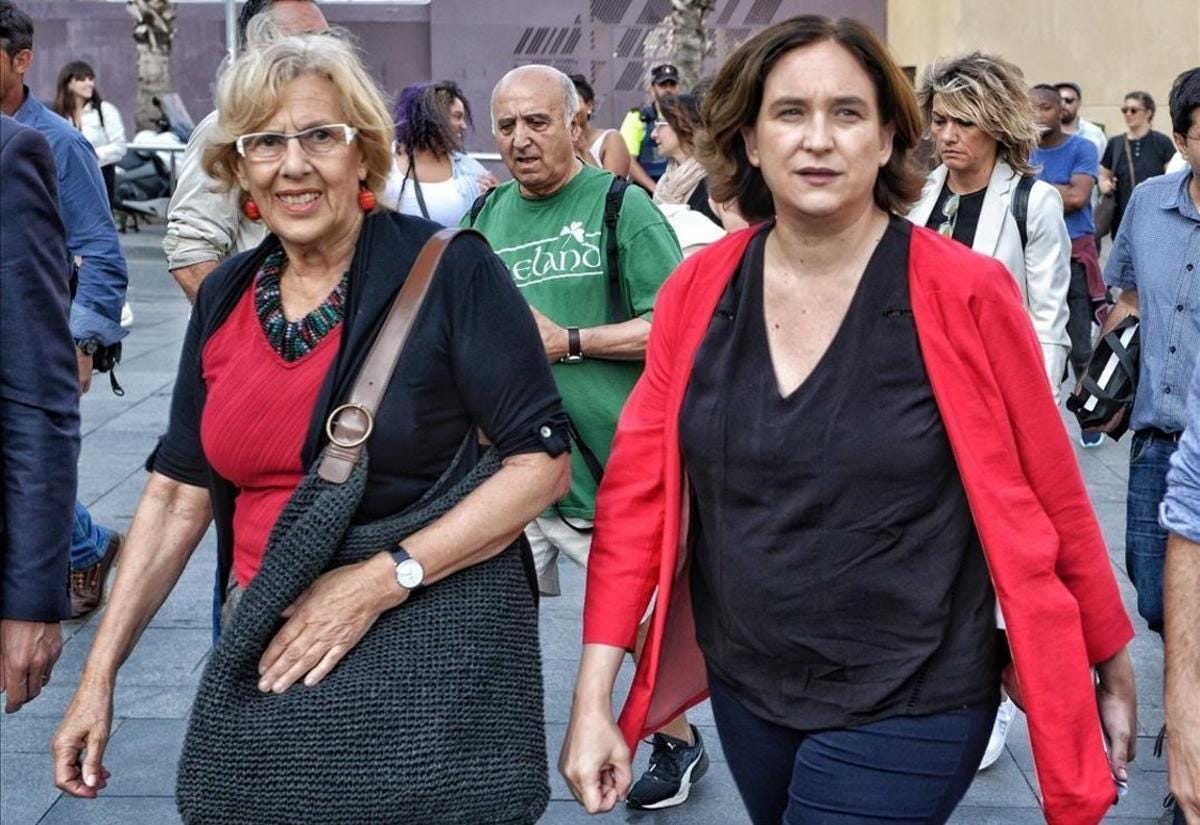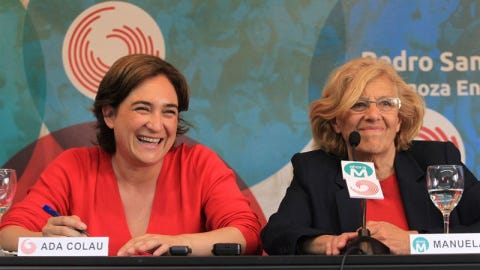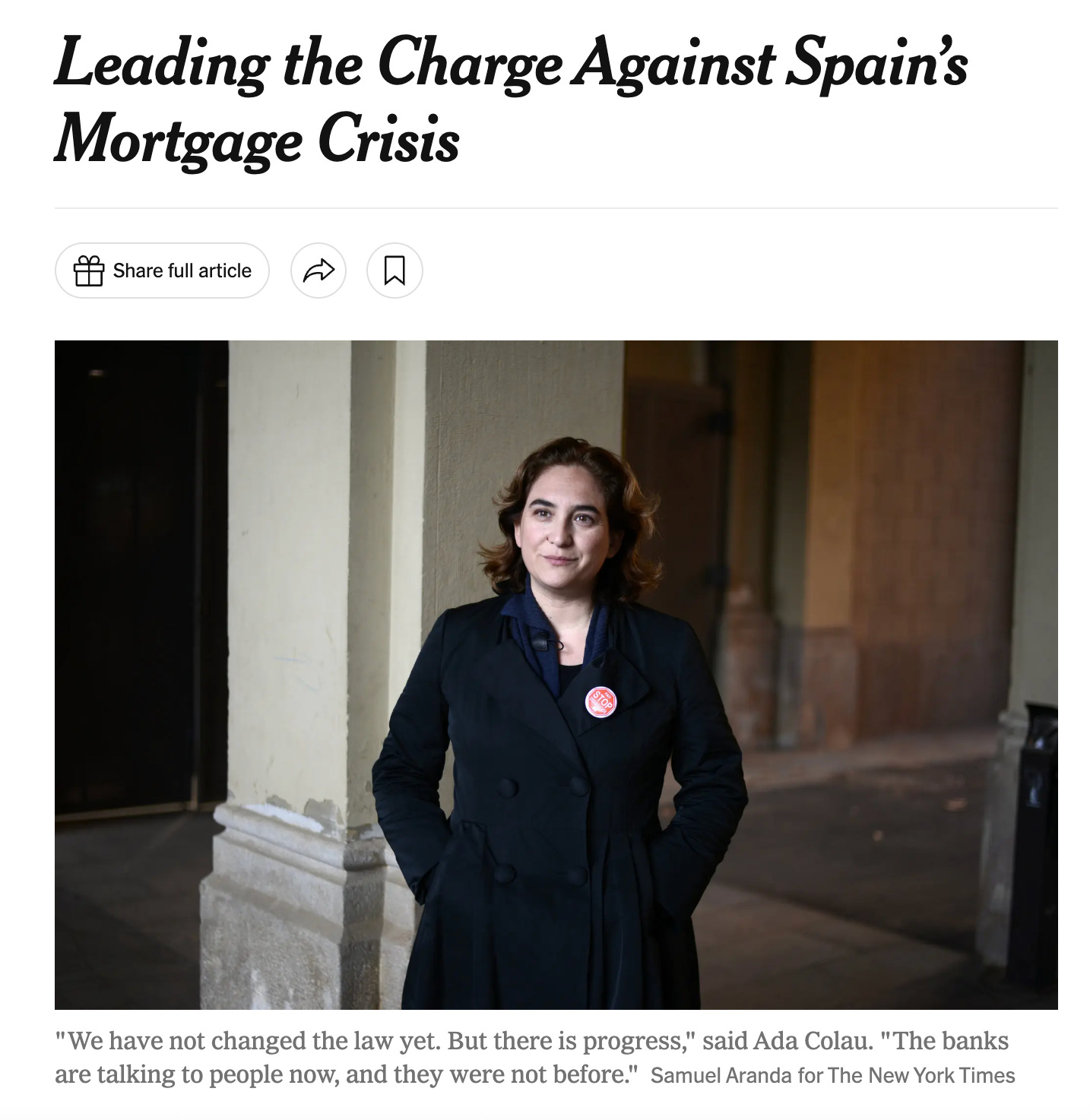The Socialist Mayors of Madrid and Barcelona
Forget the fear-mongering. Madrid and Barcelona tried it. Trash was collected. Housing was built. Power was challenged.
Critics of Zohran Mamdani invoke a vibe: “socialism” as shorthand for disorder. Grimy, chaotic, vaguely authoritarian. A place where the trash piles up and the capital flees. What they rarely talk about is governance. But if you want to know what happens when democratic socialists govern a global city, you don’t have to imagine the end of New York. You can look at Madrid. Or Barcelona.
In 2015, voters in several of Spain’s largest cities elected a new generation of left-wing mayors backed by social movements like Occupy Wall Street that grew out of the post-2008 anti-austerity wave. They were organizers, judges, lawyers — figures who had emerged from civil society, not party machines.
Many veterans of Spain’s left—those shaped by the old Communist parties, neighborhood associations, labor unions, and the horizontalist energy of the indignados—were deeply skeptical of entering electoral politics. They warned that the institutions were too hostile, the media too entrenched, and the rules rigged against real change. Some feared that movements would be swallowed by bureaucracy; others simply didn’t believe the left could win.
But Manuela Carmena and Ada Colau made a different wager. The most radical thing you could do, they argued, was not to retreat from power, but to test your ideas inside it: to see whether housing justice and climate planning could be translated into the daily work of governing and whether the left’s diagnosis of the crisis of inequality could produce a viable alternative. They took office on promises to expand housing, rein in real estate speculation, decarbonize their cities, and prioritize social services. They were accused of being too radical. They governed with competence and restraint.
Start in Madrid, where Manuela Carmena—a retired judge and former Communist—was elected mayor in 2015 at the age of 71, heading the Ahora Madrid platform backed by Podemos and local civic groups. She had no party machine behind her and little taste for ideological branding. What she had was a clear idea of what politics should deliver. “Democracy,” she argued, “is hollow if it cannot guarantee housing, dignity, and public trust.” She governed with that principle and with an approach many on the left dismissed as boring: competent, detail-oriented public administration.
Carmena’s tenure was anything but reckless. She cut Madrid’s municipal debt by over 40 percent while increasing social spending by half. She rolled out Madrid Central, one of Europe’s most ambitious low-emissions zones, which slashed traffic and air pollution in the city center. She expanded participatory budgeting, launched mediation programs to reduce evictions, and blocked plans to sell off thousands of public housing units. Under her leadership, the city opened women’s shelters, extended free school meals, added municipal preschools, and increased support for elderly residents.
Yet she insisted that her most meaningful accomplishment was something quieter: restoring trust in public institutions through good governance. “La clave es la gestión,” she told El País in 2025. “The key is management.” What frustrated her most, she said, was the left’s tendency to undervalue that work and to treat administration as something small or technocratic, rather than as the foundation of any credible alternative to neoliberalism.
Carmena governed without the backing of a party apparatus, by design. She refused to join Podemos and often clashed with its leadership, describing political parties as factories that turn young idealists into clones. That independence left her vulnerable. In 2019, Podemos splintered and ran a rival slate, Madrid en Pie, which failed to win any seats but drained just enough votes to allow a conservative coalition of the PP, Ciudadanos, and Vox to seize control of the city, even though Carmena’s list won the most votes. She called it one of her deepest disappointments: not a defeat by the right, but by a divided left that chose purity over power.
Before leaving office, Carmena also faced a year-long investigation. This was spurred by a spurious corruption complaint from the conservative Partido Popular over the city’s bike-share program, Bicimad. The case was ultimately dropped, but it dominated headlines and sowed public doubt. It was a textbook example of lawfare: legal harassment designed less to punish than to drain and discredit. The parallels to the attacks already aimed at Mamdani are easy to spot.
What Carmena’s time in office makes clear is that the question isn’t whether socialists can govern. It’s whether others will let them. Her administration was not a radical experiment but a practical demonstration of what left politics could look like in the real world: fiscally sound, socially ambitious, and oriented around the people most cities leave behind.
Barcelona offered a more activist-led model of governance. Ada Colau, elected the same year as Carmena, became the city’s first woman mayor and one of the most influential municipalist leaders in Europe. Her political roots were in the housing justice movement: as a spokesperson for the Plataforma de Afectados por la Hipoteca (PAH), she led protests against evictions and sat across from bankers at the negotiating table. That outsider energy carried into City Hall, where she made housing the city’s central political question.
Her administration required that 30 percent of all new private developments include affordable housing, an unprecedented move in Spain. She expanded the public housing stock, brought legal action against banks holding empty homes, and placed aggressive restrictions on Airbnb and short-term tourist rentals. She didn’t stop at housing. Colau launched a slate of new social programs, including a municipal dental clinic, public mental health centers for adolescents, and a city-run babysitting service for working-class families. Her government piloted a publicly owned energy utility and reimagined city infrastructure through the “superblocks” project: a globally celebrated initiative that transformed traffic-choked intersections into car-free zones, giving space back to residents and reducing emissions.
These were not symbolic gestures. They were structural interventions. And they provoked structural backlash. Barcelona’s real estate and tourism industries mobilized against her. A wave of lawsuits—many later dismissed—were filed to slow or block her agenda. The city’s conservative press attacked relentlessly, portraying Barcelona as ungovernable, its streets overrun with crime and disorder. Colau called it lawfare: legal and media warfare designed not to win in court, but to erode political legitimacy through constant noise. “It worked,” she admitted. In 2023, she lost re-election by just 342 votes.
Today, Colau leads Sentit Comú, a foundation tied to her political base, and is considered to run again in 2027. At her party’s tenth anniversary, she addressed a packed hall: “The powers that be are still scared. They know we can win again.”
What Colau and Carmena showed is that left-wing governance is not theoretical. It has been tried—in two of Europe’s most prominent cities—and in many ways, it worked. Madrid didn’t collapse under the weight of Carmena’s spending on social programs. Barcelona didn’t become a failed city under Colau’s housing mandates and environmental reforms. Neither scared off investment. What they did do was ask different questions: What if housing is a right, not an asset class? What if urban planning prioritizes pedestrians over cars? What if municipal budgets fund care work, not just policing?
They also ran up against familiar limits. Neither mayor controlled a majority in their city councils. Both governed through coalitions—often between younger, New Left parties and the more traditional, union-centric, center-left Socialist Party—which required constant negotiation and compromise. Both faced well-resourced opposition campaigns, designed not just to critique, but to delegitimize. And both eventually lost to alliances of centrist and right-wing forces, despite governing amid economic stability and social progress.
Ada Colau served as mayor of Barcelona for eight years, from 2015 to 2023. Manuela Carmena served as mayor of Madrid for four years, from 2015 to 2019. Both Carmena and Colau were ultimately defeated not at the ballot box alone, but through the convergence of political fragmentation and entrenched opposition. In Madrid, Carmena’s platform, Más Madrid, won the most votes in the 2019 municipal elections, securing 19 of 57 council seats. But she lacked a governing majority. A coalition of the conservative Partido Popular, the center-right Ciudadanos, and the far-right Vox joined forces to back PP’s José Luis Martínez-Almeida, who became mayor despite Carmena’s plurality. Podemos, once her leftist ally, ran a rival list that failed to win seats but split the left just enough to block a progressive majority. “It wasn’t the right that defeated us—it was the left,” Carmena later said.
In Barcelona, Ada Colau’s 2023 re-election bid fell just 342 votes short after years of legal harassment, hostile media coverage, and sustained opposition from powerful real estate and tourism lobbies. Her party, Barcelona en Comú, lost ground not only to the center-left PSC but also to Esquerra Republicana (ERC), the pro-independence Catalan nationalist party, which gained traction among voters who felt Colau’s position on Catalonia’s self-determination was too ambiguous or centrist. In the end, Jaume Collboni of the PSC was named mayor with outside backing from the business-friendly and right-wing Partido Popular.
Other leftist mayors in Spain faced similar challenges. In cities like Zaragoza and Cádiz, the initial energy of the municipalist wave sputtered once movements entered government. Without sustained pressure from below (ground and community support) and above (elite and air support), organizing faded, and institutions moved slowly. “The street dried up,” said Pedro Santisteve, Zaragoza’s former mayor, reflecting on the difficulty of channeling activism into governance. Community groups that had once pushed politicians became, in many cases, the bureaucracies they sought to change.
The story of Barcelona’s housing crisis today is also the story of Ada Colau’s unfinished project. As mayor, she tried to bring housing back under democratic control, taking on the same financial forces now buying up historic buildings like Casa Orsola. Her administration imposed caps on short-term rentals, expanded public housing, and challenged the idea that homes should be treated as investment vehicles. Those efforts made her a target. Now, just two years later, the Catalan government is spending millions to buy back properties Colau once tried to protect. The irony is hard to miss. What she warned would happen is happening. The difference is that now the cost is higher and the timeline tighter. Barcelona has become a case study in what is lost when political courage gives way to market logic. For Mamdani, the lesson is not just that bold housing policy is possible. It is that the forces against it are organized, and winning means being just as prepared.
These governments didn’t just promise a new kind of politics. They delivered one. They focused on practical results: more affordable housing, cleaner air, better public services, and stronger protections for working people. They showed that a government oriented around public need rather than private profit can make a meaningful difference in daily life. The opposition to Zohran Mamdani isn’t just about whether he is experienced enough. It is about whether he might prove that a different model of urban governance actually works. If a democratic socialist can improve housing, expand access to care, and make the city more livable, it becomes harder to defend a status quo built around deference to landlords and developers. Madrid and Barcelona demonstrated what is possible. The real question now is whether New York is willing to try.













https://itssimplerthanitlooks.blogspot.com/2024/10/socialism-shock-and-awe.html
Socialism is a commonplace in the US. The roads, schools, parks, fire departments, etc. are all publicly owned. The government used to build affordable housing, but Nixon stopped that, and, as he was cutting taxes on the wealthy roughly in half, Reagan cut HUD's affordable housing budget 75%. The US didn't have a significant homeless population before the '80s.
The joke is that it's socialism when the fire department puts out a fire at your house, but capitalism when the insurance company denies the claim.
IMPEACH AND DUMP TRAITOR , NAZIS , FELONS, AND CON REPUBLICONS EVERYWHERE. YES CON REPUBLICONS, CLIMATE CHANGE IS DANGEROUS, REAL, DISRUPTIVE WORLDWIDE, COSTLY, AND PREVENTABLE. STOP DENYING CLIMATE CHANGE AND FACE THE SCIENCE . DUMP THE CON RTRUMP AND CRONIES. DEPORT RTRUMP'S WIFE AND RELATIVES. BOYCOTT NAZI MUSK AND NAZI RTRUMP.